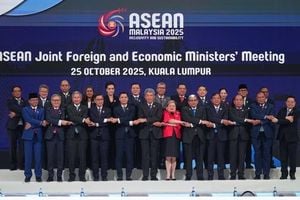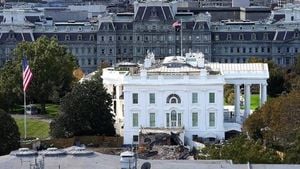The political arena surrounding Venezuela has recently been dominated by its contentious bid to join the BRICS group, provoking strong reactions from both the Venezuelan government and neighboring countries. Venezuelan President Nicolás Maduro has been vocal about his plans, stating emphatically, "No one will block or silence Venezuela, not today, not tomorrow, not ever." This statement came on the heels of Brazil's controversial veto of Venezuela's application to join the influential bloc of developing economies.
During the recent BRICS summit in Kazan, Russia, held from October 24 to October 27, 2024, the group decided on criteria for new admissions. Notably, they left Venezuela off the list of potential new members, opting instead for countries like Cuba and Bolivia from Latin America, along with nations such as Nigeria, Turkey, Malaysia, and Indonesia. This exclusion was met with fury from Maduro and his administration who characterized Brazil's decision as "hostile" and "immoral."
The Brazilian government, led by President Luiz Ignacio Lula da Silva, clarified its stance, stating it did not oppose any specific nation’s entry, but rather aimed to outline clear criteria for any new BRICS member. Brazilian officials stressed the principles guiding admissions—that prospective members should advocate for UN reforms and maintain friendly relations with existing members. Despite these claims, Venezuelan officials expressed strong discontent, accusing Brazil of adhering to former President Jair Bolsonaro's policies against freedom and sovereignty.
Venezuela's Foreign Ministry released a statement reflecting the nation's deep indignation, stating, "The Venezuelan people feel indignation and shame at this inexplicable and immoral aggression by Brazilian diplomacy." The underlying tensions stem from the July 28 elections, where Maduro's government faced criticism from both domestic opposition and international observers over the lack of transparency and accusations of electoral fraud.
During his return from the Kazan summit, Maduro described his experience as fulfilling and stated he had engaged with counterparts from nearly 30 different nations, receiving praises for his recent electoral win. He asserted, "I took the truth of Venezuela to the world with its moral and revolutionary strength,” highlighting his diplomatic outreach as integral to his leadership. Such claims, though, are met with skepticism from the opposition, which alleges pervasive state control and manipulation over electoral processes.
Maduro's administration has continuously criticized U.S. sanctions, which they argue are responsible for the severe economic crisis plaguing the country. They insist these sanctions are unjust and aimed at undermining Venezuela's sovereignty. The president reiterated his government's determination to resist external pressures, pledging never to back down against attempts to stifle its voice on the global stage.
The developments surrounding Venezuela's BRICS candidacy reflect broader geopolitical dynamics at play, as its relationships with key players, especially Brazil, continue to evolve. While Lula da Silva's administration has historical ties with Maduro, this recent fallout signals complicated diplomatic challenges. Observers note the importance of maintaining diplomatic relations amid competing interests within the bloc.
The response from Maduro also serves as a rallying cry to get support from domestic constituents, framing the veto not just as an affront to the government but as indicative of larger struggles for national dignity and respect upon the global stage. “We will not be silenced,” he declared, emphasizing unity against perceived injustices.
Meanwhile, amid these political tensions, analysts have noted the potential for BRICS to evolve as it grapples with integration and consensus among its diverse member countries. This incident may force Venezuelan diplomacy to pivot or adapt strategies as it seeks to redefine its role among emergent global coalitions.
Venezuela’s lofty aspirations to join BRICS and the cataclysmic aftermath of Brazil’s veto serve as stark reminders of the challenges faced by Maduro and his administration, caught between external pressures and internal dissent. The struggle for recognition and legitimacy continues, and as the nation embarks on attempting to maneuver complex diplomatic waters, the international gaze remains intently focused on Caracas.
Despite the challenges, Maduro's insistence on resilience reflects broader themes of defiance among nations resisting external pressures; as he stated, "whoever tries to silence us will be defeated." The episode not only reshapes Venezuela's international relationships but also raises questions about the nature of alliances and power within the ever-shifting thematic structure of BRICS.



